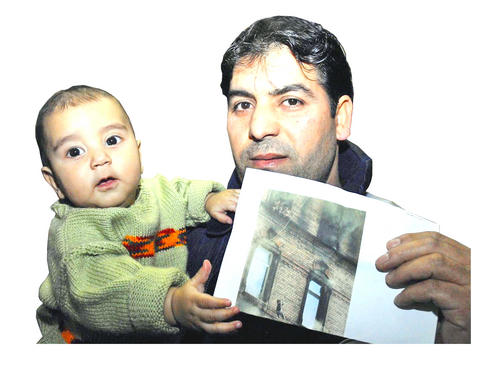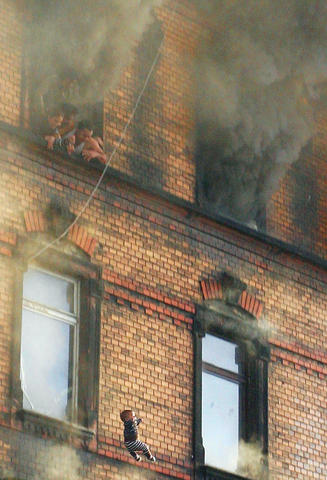The baby
The nightmare scenario of a fire in a packed German tenement block has been captured by one photograph. It shows a small baby in free fall through smoke-filled air. His eyes are closed and his arms are outstretched, as if reaching out for someone. The ground is far, far below. There are no safety nets or blankets, but a forest of arms is already stretching upwards to catch him.
The baby wasn't the only one to fall through the air like this. "People screamed out of open windows. Parents threw their children down, towards the hands of policemen. Then they jumped too," one eyewitness said. But it was the baby that held the world's horrified gaze.

PHOTO: AFP
Within hours of Sunday's blaze it was reported that the baby boy, Onur, had survived. A split second after his uncle threw him from the third floor of the flaming building, a police officer managed to catch him, saving him from hitting the concrete street.
Police confirmed that baby Onur, who is around six months old, was released from hospital yesterday and is doing well.
The police officer

PHOTO: AFP
The police officer, whose identity has not been released, but whose fast reflexes have generated headlines such as "The wonder of Ludwigshafen," was one of 500 emergency workers who raced to the blaze.
"Our colleague was injured as he dived to save the fast-falling baby. His actions meant the baby didn't hit the ground," said Ludwigshafen police spokeswoman Simone Eisenbarth. "He is still recovering. The experience left him in shock and he is having counseling to come to terms with the trauma." He and many of his colleagues are still off duty following the house fire, in which nine people died, including five children and a pregnant woman.
It has been described as the worst fire in western Germany since the World War II. Some 60 people were severely injured and many more were treated by emergency services outside the building on Danziger Platz.
The local mayor honored the rescue services, saying they risked their lives and performed ubermenschlich, or superhuman tasks.
The parents
With a scream, Onur's uncle let the baby fall. The mother cried uncontrollably. Then both jumped out of the smoke-filled window after the child, according to eyewitness reports. The pair, like the majority of people in the building, are Turkish. The police said they are recovering from their injuries. Onur's mother is still in hospital.
The building
The block of flats was more than a century old. It was home to three Turkish families and 24 people were registered as living there.
On Sunday, Ludwigshafen, like towns and cities across western Germany, was in the midst of its annual carnival celebrations, replete with a colorful procession and lots of drink. "The carnival route went right by the building. It seems the flats were crammed with visitors as friends and relatives had come over to celebrate and see the procession," one official said.
Its staircase was made of wood, which went up in flames instantly, trapping everyone. "We had to give up on searching inside. After three or four minutes the stairs collapsed," said firefighter Peter Friedrich.
Kenan Kolat, president of the Turkish organization TBB, yesterday joined family and friends of the victims for a minute's silence by their former home. He described his shock at the desolate remains of the building.
"I have just got back from the site and it was gutted. A ruin. Firemen were carrying away parts of the building to try to find out what happened," he said. "The mood here is so distraught. Some of the children who died were so young, too young to understand. They were just starting out in life. It is tragic. I met a man who lost two children and his wife in the blaze. He was speechless. But what is there to say? He had done his best to help them."
The Bild newspaper published a picture of a three-year-old standing beside his two-year-old brother in a buggy. "Kamil and Kenan. They have not survived," read the caption.
The fire
Germany has been awash with rumor and specu-lation about how the fire started. One young Turkish girl told the N24 television channel that she had seen a man setting fire to a stick near to the house. Someone injured in the blaze told ambulance staff there was a loud bang, like an explosion.
The tragedy has raised fears among Germany's Turkish community of a targeted attack, and Turkish Prime Minister Recep Tayyip Erdogan has echoed their concerns. On Turkish television, he said the country did not want a repeat of 1993's firebomb attack on a house in Solingen, in the far west of Germany, in which five Turks were killed. "After the racist acts of violence in the past the question arises: was this fire an accident or not?" he said.
A delegation headed by State Minister Mustafa Said Yazicioglu would soon leave for Germany to hold talks about the fire, he added.
If it was arson, it may well have been a racially motivated attack, but at the moment, the shell of the building is at risk of caving in, hampering the investigating team's search for evidence. "The roof is being lifted off to take some weight away from the weak structure. It is essential for our work that the building doesn't collapse," a member of the local police force said. Turkey is also sending in a team of investigators to try to find out what happened.
"At the moment we don't even have a vague suspicion or lead about what might have caused this fire," admitted Simone Eisenbarth from the press center of the Ludwigshafen police. She said she had taken phone calls from across Europe.
The photographer
The image of the falling baby was taken by 43-year-old web designer and sport photographer Rene Werse, who happened to be walking past the platz after the carnival.
Werse, who had been taking pictures of the procession, snapped as the baby was mid-air. The picture was beamed worldwide by news agencies. He told a German web magazine how it slowly dawned on him what was happening.
"As I came past the house there was nothing to see, no smell of smoke, but then I saw lots of people on the balconies and at the windows. They were shouting and breaking through the windows," he said.
"The drama wasn't clear from the outside of the building, but rather from the people themselves. There was pure panic on their faces."

Growing up in a rural, religious community in western Canada, Kyle McCarthy loved hockey, but once he came out at 19, he quit, convinced being openly gay and an active player was untenable. So the 32-year-old says he is “very surprised” by the runaway success of Heated Rivalry, a Canadian-made series about the romance between two closeted gay players in a sport that has historically made gay men feel unwelcome. Ben Baby, the 43-year-old commissioner of the Toronto Gay Hockey Association (TGHA), calls the success of the show — which has catapulted its young lead actors to stardom -- “shocking,” and says

The 2018 nine-in-one local elections were a wild ride that no one saw coming. Entering that year, the Chinese Nationalist Party (KMT) was demoralized and in disarray — and fearing an existential crisis. By the end of the year, the party was riding high and swept most of the country in a landslide, including toppling the Democratic Progressive Party (DPP) in their Kaohsiung stronghold. Could something like that happen again on the DPP side in this year’s nine-in-one elections? The short answer is not exactly; the conditions were very specific. However, it does illustrate how swiftly every assumption early in an

Inside an ordinary-looking townhouse on a narrow road in central Kaohsiung, Tsai A-li (蔡阿李) raised her three children alone for 15 years. As far as the children knew, their father was away working in the US. They were kept in the dark for as long as possible by their mother, for the truth was perhaps too sad and unjust for their young minds to bear. The family home of White Terror victim Ko Chi-hua (柯旗化) is now open to the public. Admission is free and it is just a short walk from the Kaohsiung train station. Walk two blocks south along Jhongshan

Francis William White, an Englishman who late in the 1860s served as Commissioner of the Imperial Customs Service in Tainan, published the tale of a jaunt he took one winter in 1868: A visit to the interior of south Formosa (1870). White’s journey took him into the mountains, where he mused on the difficult terrain and the ease with which his little group could be ambushed in the crags and dense vegetation. At one point he stays at the house of a local near a stream on the border of indigenous territory: “Their matchlocks, which were kept in excellent order,